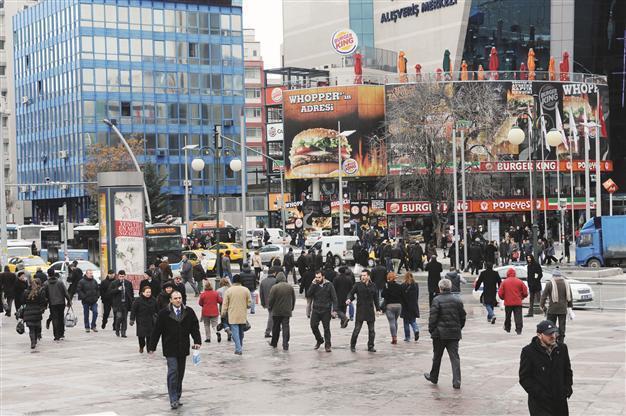Low interest rates thwart income equality: TÜSİAD report
ISTANBUL

Turkey is the third country with the highest income inequality after Mexico and Chile, according to OECD figures that were recalled by TÜSİAD Chairman Haluk Dinçer during the launch of the ’Individual Income Distribution Inequalities in Turkey’ report. DAILY NEWS Photo
Income disparity in Turkey has widened at times of low interest rates since 2007, a new report released by Turkey’s top business organization has stated, amid heated interest rate debates between the Central Bank and the government.Low interest rates, as well as macroeconomic reforms and strong growth, helped to narrow income disparities in Turkish society between 2001 and 2007, after which changing consumer behavior caused low interest rates to turn against income equality, according to the Turkish Business and Industry Association (TÜSİAD) report.
The course of income distribution in the country between 2002 and 2011 and the impact of macroeconomic policies are the subject of TÜSİAD’s “Individual Income Distribution Inequalities in Turkey: Functional Income Sources and Regional Inequalities” report.
“Turkey is still the third country with highest income inequality after Mexico and Chile, according to OECD figures,” TÜSİAD Chairman Haluk Dinçer said, speaking at the report’s launch on June 27.
Dinçer said income disparity should be combated by “active policies” formed by economic managers, adding that the government’s current policies were known to have “inequality amplifying effects.”
“We reach the same conclusion when we compare the share of the total income received by the richest 20 percent and the share received by the poorest 20 percent,” he added.
“The difference [in income between the top and bottom 20 percent], which was slightly higher than nine times in 2002, had dropped to slightly higher than seven times in 2007. However, the difference remained at the same level in 2011 [as it was in 2007],” Dinçer stated.
According to the report, a low interest environment and prosperity in economic growth were reflected in household income and enabled more segments of society to benefit from the rise in welfare between 2002 and 2007, the first five years of Justice and Development Party (AKP) rule. However, all individual income inequality indicators marked a breaking point in 2007, when the momentum gained over the previous five years appears to have been lost. The report points to low interest rates as the biggest reason for stagnation.
Interest rate income has been a major source of disparity in Turkey for years and the reduction in interest rates following the 2001 reforms served as a curative factor, the report suggests, adding that the persistence of low interest rates prompted citizens to consume and made them more reluctant to save.
It said that as the savings and interest rate incomes of low-income groups usually decline faster than the high-income segments of society, in proportion with the amount of deposits, the income gap between the top and bottom of society had expanded. It added that the government’s decreasing interest in policies that could address the problem had further slowed down the gains achieved from 2002-2007.
“The maintenance of income equality requires effective strategies,” read a statement released to present the report’s findings. “Rehabilitation of income creation processes are needed for growth to have an income disparity recovering effect.”
Turkey has recently been witness to a heated clash between supporters of low interest rates, led by Prime Minister Recep Tayyip Erdoğan, and their opponents, who see higher interest rates as necessary to defend price and currency rate stability.
Within this framework, Erdoğan, championing lower interest rates to boost growth, harshly criticized the Central Bank’s move to massively hike all three key interest rates to protect the Turkish Lira’s sliding and high-proceeding inflation.
In January, the Bank raised its overnight lending rate to 12 percent from 7.75 percent, its one-week repo rate to 10 percent from 4.5 percent, and its overnight borrowing rate to 8 percent from 3.5 percent – all much sharper moves than economists had forecast.
Particularly in the past few months, seeing the traces of slight recovery, Erdoğan raised his criticism against the institution. However, the Bank has continued to insist on a more gradual and measured reduction policy in its last two monetary policy meetings.
After cutting its one-week repo rate by 0.5 points in the May meeting, on June 24 the Bank cut it 0.75 points further, which was still not enough to satisfy the prime minister’s call for a sharp reduction.
















